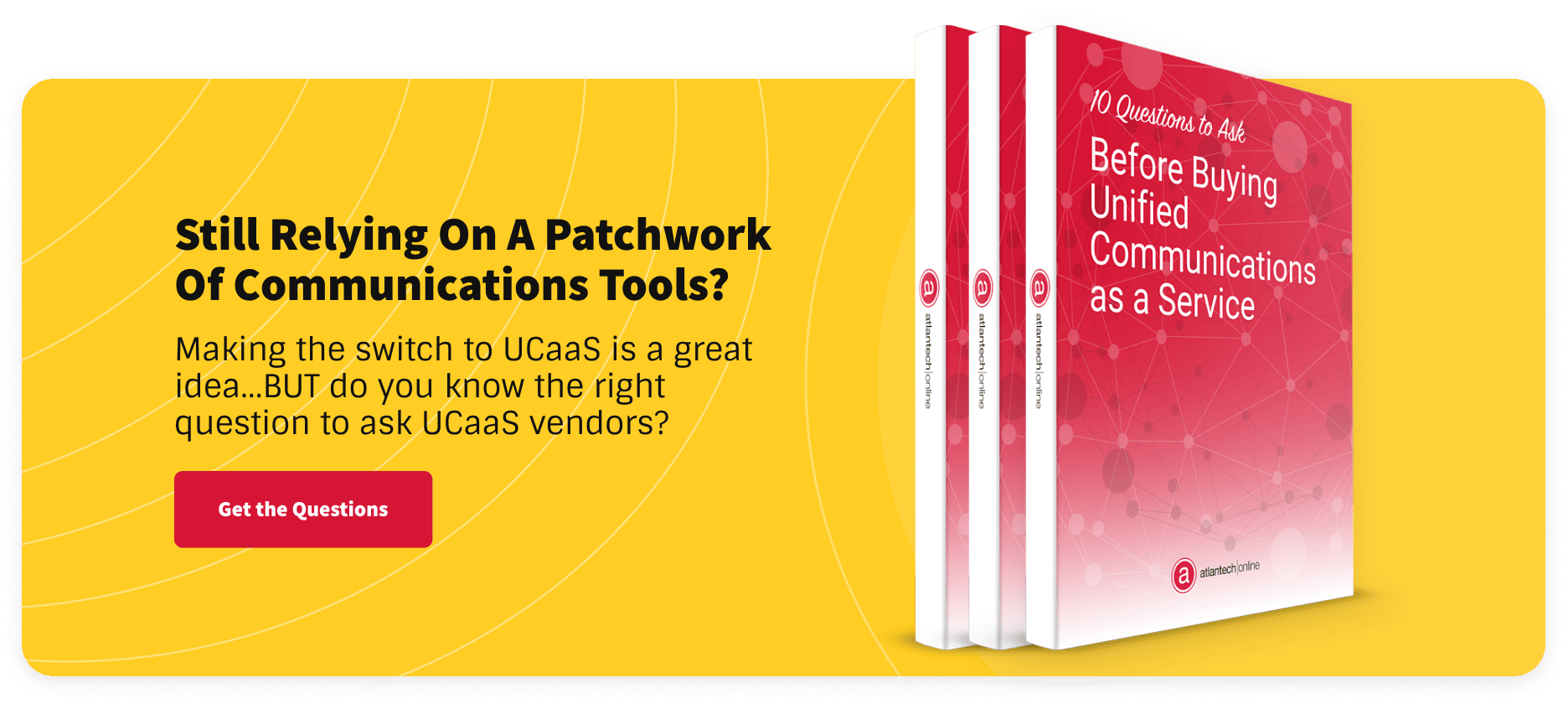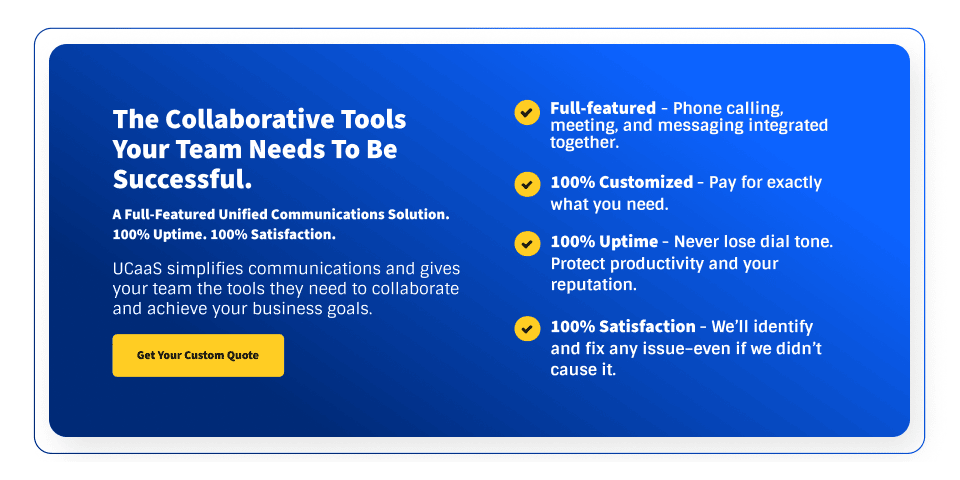[GUIDE] How to Evaluate UCaaS Providers (and Avoid Bad Ones)
![[GUIDE] How to Evaluate UCaaS Providers (and Avoid Bad Ones)](https://www.atlantech.net/hubfs/Blog_images/Featured%20Images/Learn-how-to-evaluate-UCaaS-providers.jpg)
When it comes to your company’s communications infrastructure, there is no going back to “how things were” before 2020.
Working from home, hybrid work models, and distributed teams are no longer the exception. Companies that understand this shift and respond accordingly will set themselves up for growth and success moving forward.
To put it bluntly, cloud-based communications services like UCaaS are the path forward.
But two big questions remain:
- Of all the UCaaS providers out there, who is the best fit for you?
- How do you evaluate UCaaS providers?
This puts a premium on finding the best UCaaS provider who can meet the requirements you're looking for, help you through the migration process, and be there for you over the long term.
Migrating from a legacy PBX to UCaaS is no small feat. It is a critical investment for your company’s future. That’s why we want to help you get the decision right the first time.
6 Criteria for Evaluating UCaaS Providers
When it comes to a business-critical investment like choosing a UCaaS, you need to make the right choice. With your data, uptimes, and client communications at stake, your UCaaS provider choice can make a world of difference.
The following are several criteria and red flags to help you sort through the numerous UCaaS providers and find the UCaaS partner that best fits your company’s needs.
1. Do they offer the services you need?
The ideal UCaaS provider should meet all of your business communication needs. Determining if a provider can deliver the services you require is an essential first step.
Each provider should offer a list of services they provide on their website, along with a detailed explanation of how their software works. Since UCaaS handles all your business communications and puts it over Internet Protocol (IP), these providers are multi-modal.
Many UCaaS providers offer services such as:
- Collaboration tools
- Instant messaging
- Video conferencing
- Documents and file sharing and storage
- Call parking
- Call logs
- Softphone
- SMS messaging
- Desktop sharing
- Integration with email and fax
Matching up your needs with a providers’ services is an essential first step to alignment. The best-case scenario is when a UCaaS provider offers all of the services you’re looking for. If a UCaaS provider offers some of the services you need but offers to find third-party options to fill in those service gaps, that should be a red flag.
UCaaS providers specialize in having all their services available in one centralized software. When you’re dealing with third-party vendors for extra services, there are new unknowns.
Third-party vendors introduce different Service Level Agreements, technical support, customer support, and compatibility. To keep your UCaaS centralized, stick with one provider that delivers all the services you need within one software solution.
2. How reliable is their service and support?
Once you have found a provider that offers all the services you need, the next step is to evaluate the provider’s reliability and support. Determining UCaaS providers’ reliability can be done by analyzing several metrics and policies.
UCaaS providers’ uptimes are an essential metric that shows how well their software performs and its reliability. There are also many details in a provider’s issue mitigation plans and Service Level Agreement (SLA) that help analyze reliability.
Within the issue mitigation plan, UCaaS providers must avoid common pitfalls and set up contingency plans. An airtight mitigation plan helps avoid bottlenecks in the rollout process while mitigating risk.
At a minimum, a quality Service Level Agreement should provide information about:
- Usage
- Length of time to provide services
- Privacy
- Security
- Implementing moves, adds, changes, and deletions
- Updating 911 routing databases
For support, there are two areas to focus on: customer service and technical support. When technical or account issues arise, it’s crucial to have support teams in place to handle issues efficiently and effectively.
Without information about uptimes, SLAs, mitigation planning, and support, it’s unclear whether or not a UCaaS provider can meet your business needs. If a provider cannot provide information about these topics, it may indicate poor management or organization.
3. What would the migration process look like?
Many factors from the migration process impact your business. When comparing UCaaS providers and meeting with their sales staff, ask for an outline of the migration process. Ideally, this would include information about the timeline, costs, and their approach to migration. For example, some UCaaS providers utilize a phased approach while others do not.
Having an outline of what happens after you purchase their software or services is helpful to gain insights into their onboarding and migration processes. If a provider cannot give you a clear outline of their migration process, it may be a red flag that the provider lacks planning or implementation processes.
4. How easy is it to manage?
UCaaS providers offer services that require distinctive management requirements. When considering your UCaaS provider options, ask about how easy the management process is. Some providers may offer a do-it-yourself solution, while others offer additional management services or recommend hiring a third party.
Providers should have in-depth knowledge about the management process of their clients’ UCaaS solutions. If a provider cannot address the manageability of their software, that should be considered a red flag. This lack of information may indicate they use third-party solutions or the provider doesn’t have much experience migrating and managing clients.
5. Does their UCaaS solution meet your security & compliance guidelines?
Maintaining your cybersecurity is of the utmost importance. Securing your data and software solutions is essential to protecting sensitive information and preventing data breaches. A trusted UCaaS provider should have guidelines detailing their security and compliance measures.
Security considerations for UCaaS include:
- Data encryption
- Safe and secure VoIP calling
- Fraudulent activity tracking
- Secure data centers
- User access permissions and controls
- Network security considerations
- Avoidance of multi-tenancy issues
- Compliance with federal and regulatory requirements
Without the presence of these security and compliance considerations, it’s unclear if a provider can protect your data. At Atlantech, we recommend connecting with a UCaaS provider that not only provides you with centralized communication but also protects your company’s data and reputation.
6. Do they have references you can talk to?
Nothing gives you more of an accurate representation of a company than past client reviews. Receiving case studies from a UCaaS provider’s case satisfied clients can give you insight into the quality of their services and client relationships. To ensure you’re getting unbiased feedback, check other online reviews such as Google reviews, TechRadar, UC Today, and TrustRadius.
The lack of online reviews or client case studies may indicate that the provider has limited experience in the industry. The best-case scenario is to find UCaaS providers that have positive online reviews and successful case studies.
Choosing the Right UCaaS Provider For Your Business
Your company deserves a UCaaS provider that meets your communication needs and exceeds your expectations. Some of the most common problems customers run into with the UCaaS industry include unreliability, poor cybersecurity, and a lack of operational planning. Your business cannot afford spotty service, slow response times, and rigid packages found with the Big Telecom providers in the industry.
At Atlantech Online, we’ve been in the industry since 1995, and we’re proud to offer reliable and secure UCaaS solutions to our customers. Atlantech offers robust, comprehensive UCaaS features and exceptional service without the hassle and frustration of working with giant telecommunications corporations that can’t meet all of your needs.



